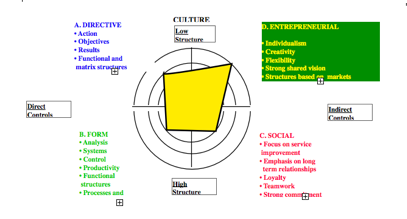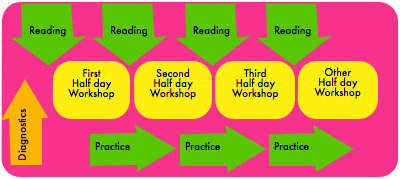
Optimising Performance Development of Organisational Culture
What is culture
Culture is the result of the relationship between the staff and the organisation - how staff feel about the organisation and how the organisation feels about staff.
It can be described as "the way we do things around here". Culture is the system of attitudes, philosophy, beliefs, and relationships, shared within a group. It's often reflected in the way people behave and the organisational self talk, which is just as influential as individual self talk. It tends to come out at the office parties and in the tea room. It is the subject of myths and stories told and retold. Understanding these stories and if necessary helping to change them is a powerful tool towards establishing a new culture.
Culture is transmitted from person to person through observed behaviours and learning. Research (Nicholas Christakis, Harvard Medical School, New Scientist; 1/3/2009) found that our moods are far more strongly influenced by those around us than we tend to think and transmitted through networks in a way that is not yet entirely understood. The bad news is that negative cultures become more negative through vicious cycles of contagion. As I once heard Mark Blumsky say: "It's not the sad people that I worry about. It's all the people they drag down!" However, the good news is, positive cultures also become more positive through virtuous cycles of contagion. As a Change Agent I know that once you get the flywheel spinning, people are eager to get on-board; after all working together cooperatively is our natural way, and when we can't, we all die to some extent.
Why Culture matters
In today's environment many organisations are taking a hard-nosed, commercial view on culture and values and assuming that financial reward is what matters. In the name of rationalism it’s tempting to eliminate meetings, lunch rooms, coffee breaks, conferences, Christmas parties and other face-to-face interactions, forgetting the missed opportunities in terms of social norms, building loyalty and setting the conditions where people will extend themselves, be more flexible and willing to pitch in. Police, soldiers and firemen don't risk their lives for the money; they do it because of social norms, pride in their profession and a sense of duty. Culture matters so it's important to create opportunities for people to get closer to others they work with and interact with.
People who find themselves in an organisation where Culture doesn't match their personal values, either operate under very high personal stress or find it intolerable and leave.
In some quarters of the business world, culture is still considered soft and not taken as seriously as say, operations or strategy. Yet, according to research by Mike West Aston, Business School UK, culture has even more impact on organisational performance than strategy. One hundred organisations evaluated over an 8 year period showed that Strategy attributed 2% to the variance in performance compared to Culture which attributed 17% variance in performance.
Other ground breaking research reveals that Culture is one of only four things that truly make a difference. The study made it clear that building the right culture is imperative. This is one that champions high-level performance and ethical behaviour, where everyone works at the highest level, encouraging outstanding individual and team contributions and holds everyone (not just managers) responsible for success.
Culture is important because it drives the Values and influences the way we behave. There is a direct link between Culture and performance. For example it is almost impossible to be proactive and entrepreneurial in an organisation that has a culture of low risk and tight controls.
In negative cultures people are more likely to slow down or make errors deliberately, hide from their bosses, put in only minimum effort, take sick leave, resign or look for alternative employment and care less about the customer. Before you say this doesn't apply to me, Gallup research of New Zealand workplaces shows 15% of people are 'actively disengaged' and 68% are 'disengaged.' Only 17% are 'engaged' and this is down from 23% in 2002. Gallup estimates the annual cost of this is NZ$3.67 billion.
In other quarters, culture is considered important, but the emphasis is on making the work environment fun. This is based on the theory that if the employees enjoy themselves they are more likely to remain loyal to the company. This is a narrow view.
How to measure your current culture
Our Product
There is no such thing as the right culture for all circumstances. The right Culture depends upon your strategy: Operational excellence, Customer intimacy, or Product leadership. Our Culture product reinforces your strategy.
One of the secrets of our product is that we have found hard empirical ways of measuring the appropriate Cultural dimensions for your organisation. These dimensions include the balance between internal focus and external focus; the balance between direct controls and indirect controls, the extent to which communications are closed or open, whether the motivation comes mainly from production or innovation, whether the relationships are team based or individual based. It's important to realise that this is not an "either/or" situation, all organisations need internal and external focus, all require direct and indirect controls; rather it's a matter of centre of gravity.
For example, the appropriate Culture for a Product Leader (customers get products which are constantly redefining the state of the art) may look something like the chart below with mostly indirect controls and external focus; however the shape for Customer Intimacy would be quite different and it would be different again for Operational Excellence:

Have a look here for a living Case Study of Culture.
The Modular Approach
To change Culture takes time, it can't be pushed on people and it can't be rushed. Culture is a reflection of the habits within the organisation, and to change habits takes time. It usually involves developing new skills, knowledge and attitudes; and helping people see a bigger meaning in the work they do. We have found that the best results are achieved by working with teams in short (1-4 hour) biweekly modules over a period of about two months. This produces lasting results without killing the budget and the participants.

Every Culture Process we undertake is different and tailored to fit the client like a glove after a careful Diagnostics Stage (see chart above).
However during this process we work with managers and staff to:
- Define the appropriate Culture
- Introduce the required Culture
- Examine all processes, procedures and policies so they reinforce the new Culture
- Examine structural issues and organisational issues that arise with the introduction of Culture
- Support managers and staff who are having problems in adopting the new Culture.
When to look at Culture
The following are signals that you may need to examine your Culture:
- Poor morale
- Loss of best staff
- People stressed
- Poor customer service
- Rituals, symbols and myths not positive
- Systems, processes and procedures that seem to pull against the strategic objectives
- Unwritten rules/barriers
- Self talk of organisation unhelpful
- Managers and staff with no common understanding of Vision.
Probable outcomes of Culture
Benefits from a stronger Culture include:
- Better morale across the organisation
- Better team work
- Less stress
- Higher profits
- More speed
- Reduced costs
- Happier customers
- Increased competitive advantage
- Less need for rules and restrictions
- People working as though they owned the business
- Better cohesion and collaboration between various parts of the business
- Everyone working to the same agenda
- People working hard on the business rather than in the business
- Fewer surprises
- More collaboration and participation because everyone understands their role
Product support
This product has been developed and is supported by Bruce Holland with help where required from other members of the Virtual Group Business Consultants.
Guarantee
All work undertaken by Bruce Holland is guaranteed. If at the end of the program the client doesn't feel that they have received value for money, they may adjust the bill and pay an amount equal to the value they feel they received.
Next step
For more information about how you can use our Culture Program give the Virtual Manager a call or ring Bruce Holland direct.
Bruce Holland
Phone +6421 620456
Bruce.holland@virtual.co.nz.
Key words: Leadership, leadership development, leadership management, leadership training, leadership program, leadership skills




